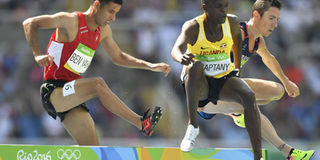Olympics: You can’t pick money in Jinja when walking in Masaka

Araptany (C) put up a show of steel to storm the steeplechase final yesterday. PHOTO BY AFP
Imagine, for a moment, that a Ugandan athlete had won a bronze medal in the 5,000-metre race at the just-concluded Rio Olympics. Even better, imagine that Stephen Kiprotich, the hero at the London games four years ago, had done the unimaginable and retained his Olympic marathon gold.
Something tells me that we would all be over the moon. There would be a joyous homecoming, a dinner at State House, cash handouts, and corporates scrambling to sign up sponsorship deals. But would it represent progress? Success?
The easy answer is yes, success, because they would have won medals, and in the case of defending the marathon, done something truly historic. The more difficult - and thus interesting - answer would be, it depends on what the objectives were, what we set out to achieve in the first place.
Arguably the greatest sporting show on earth, the Olympics are unique in that they provide a platform for talent to work with organisation, for individual glory to add to national pride.
They are also, in our case, a brutal reminder of how short-sighted and narrow our goals are, with sports only a heart-breaking reminder of what is a far-reaching failure of imagination and ambition.
It is possible to find success by accident, or by doing the wrong things. It is also possible to fail whilst doing the right thing, but one can never find success consistently without having clear objectives, a plan of action, and the ambition and desire to execute it. You can’t always be the one who picks money in the street!
Before London 2012 Uganda had not won an Olympic gold medal since John Aki-Bua in 1972. Yet Kiprotich’s success was due to individual talent and ambition, not the outcome of a deliberate plan to invest in athletics and produce world-beaters. We found success, yes, but it was by accident.
There are at least two lessons from this. The first is simple; talent is nothing without investment in facilities and preparation. The playing fields at Lugogo, which used to produce our sports champions, now produce guards at the sprawling malls and used car lots they were turned into. Having long given up on winning gold in the ring, the talented boxers from Naguru now win gold necklaces and mobile phones in the dark alleys of the city.
The second lesson is that to compete (rather than just participate), you need to cast away the mediocrity which we’ve spent most of our lives snuggling into, like a warm blanket on a cold rainy night, and try to win.
What is the point of trying to qualify for the African Cup of Nations and the football World Cup if we have no plans or even desire to win it?
This mediocrity, unfortunately, goes beyond sports. We are a country that hopes an agricultural revolution can sprout forth from small-scale farmers with hand-held hoes dating back several centuries.
We are a country that puts our hopes of becoming modern and competitive in a digital world in the hands of many leaders who in other countries would struggle to hold down clerical jobs.
Yes, we will run into success every so often, as we did in London, but by accident, not design.
So of course, we were successful in Rio, in my view. Our ambitions were “as-if, as-if” and our performances were “there-there”. None of our athletes won a damn medal, but none was arrested for rape, passing counterfeits or gun violence, either.
It is said that the secret to happiness is to set low or no expectations. Officials from some countries that set medal targets and invested in facilities and training are kicking themselves or crying into their beer for being a few golds short here and there.
Until we invest in the grunt work and set realistic but ambitious targets for success, we should just celebrate that our boys and girls got their moments in the sun, frolicked around, got some incredible personal memories, and came home safe. Even picking money requires luck, presence and preparation; you can’t pick money in Jinja when you are in Masaka!
Mr Kalinaki is a Ugandan journalist based in Nairobi. [email protected]
&Twitter: @Kalinaki




